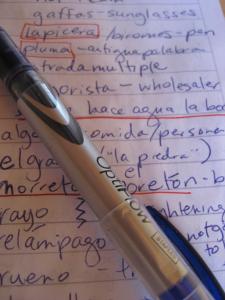Diós mio!!!! How will I ever learn Spanish?
- Try to spend at least one hour per day learning Spanish. Mix it up- 15 minutes in the morning watching TV, online 20 minutes at some point during the day, talk to yourself in Spanish while driving in the car, etc.
- Study textbooks of increasing difficulty. The first book that I bought was “Spanish for Dummies”, now I study Intermediate textbooks.
- Learn vocabulary like crazy!! Learn the Spanish words for everything that you see in your life.
- Don’t put yellow stickies on items all around your house that have the Spanish word for that item on them, your wife will get grouchy about that.
- Translate anything that you see written in Spanish. Brochures, signs in stores, labels and instructions on cartons and boxes.
- Speak Spanish anytime that you can. I don’t always have someone to speak with so I talk out loud to myself.
Driving down 38th Avenue in Northwest Denver, you wouldn't necessarily notice this little gem that opened up in September 2007 to provide a little slice of Miami in Denver. A delightful sandwich and coffee shop, Buchi Cafe Cubano offers a more everyday, accessible version to Cuban fare than, say, Cuba Cuba or LoDo's Samba Room.
- Listening activities through the University of Texas is one of the best resources available, providing videos of native speakers talking about various topics, ranging to talking about a typical day to more advanced discussions of current events. Each topic has 6 native speakers talking about the subject, exposing students to different accents and vocabulary.
- LingusTV is another great site offering free dramatic videos with subtitles in Spanish for all levels. The videos are funny and entertaining, providing an enjoyable way to strengthen listening skills.
- Livemocha: is a free website for learning various languages. The site is a great way to practice the language in a fun and interactive way, while providing the necessary opportunity for plenty of repetition.
Who's the best teacher? The native speaker debate.
While teaching English in Argentina, I was surprised about the number of students who were excited about having a native English-speaking teacher. At the same time, it was interesting how little our group of native English speakers knew about the rules and grammar of our own language in my English teaching course. Have you ever thought, for example, about how there are three different sounds for regular verbs in the past? The suffix -ed in worked, wanted, and learned are all different and there's a reason why they're different. Who knew?
As a teacher of both English and Spanish, I have been thinking a lot lately about the advantages and disadvantages to native versus non-native language teachers. Some language institutes only hire native speakers, but does that really mean native speakers or better teachers?
Finding the right language teacher
What is the Diploma de español como lengua extranjera (DELE)?
The Diploma de español como lengua extranjera (DELE) is the standard of Spanish competency tests, offered two to three times a year through the Cervantes Institute at testing sites in major cities throughout the world. The test offers three levels, Incial, Intermedio, and Superior and provide a diploma credential for those who'd like to have something more on their résumé than conversational or fluent in Spanish. A fourth level before Inicial will be offered in May of 2009. In the Spanish-speaking world, the DELE superior is recognized as "native-like fluency" for jobs and school.
DELE test format

- Trabalenguas: literally "tongue obstacle" or tonguetwister. A few examples:
Tres tristes tigres trigan trigo en un trigal
Mi mamá me mima mucho
- Paracaídas, paraguas, rompecabezas or any other compound word: The fall stopper (parachute), water stopper (umbrella), or head breaker (puzzle).
- Esposas: wives or handcuffs. Seem machista? In English we have the old ball and chain...
- Tranquilo (chill/mellow) does a great job of describing all types of things.
- Estrenar, tutear are nice concise verbs, to use or show something for the first time (estrenar) and to use the familiar tú form (tutear).
- Ojo: this is a great gesture (pointing to your eye) or verbal warning to watch out.
Surrounded by Spanish
The best way to learn a language is to immerse yourself in it. Whether that means living abroad, traveling, or taking advantage of exposure to Spanish in Denver, you will learn to speak and understand Spanish faster than studying in the classroom once a week. The classroom will give you the structure you need to create and build on a foundation, upon which you can explore the language and culture in its authentic setting.
I recommend music, films, television, radio, learning cds, media, and internet resources to keep you improving your Spanish outside of class. Most importantly, I recommend you speak with native speakers of Spanish whenever you get the chance. They will appreciate your effort and you'll get great practice!
Películas (films)
The 9th Door is supposedly named after a bar in a small town in the south of Spain, where expats would gather to drink and share stories. The bar was only recognizable by the 9 etched on the door, thus, The 9th Door. So says the menu...

